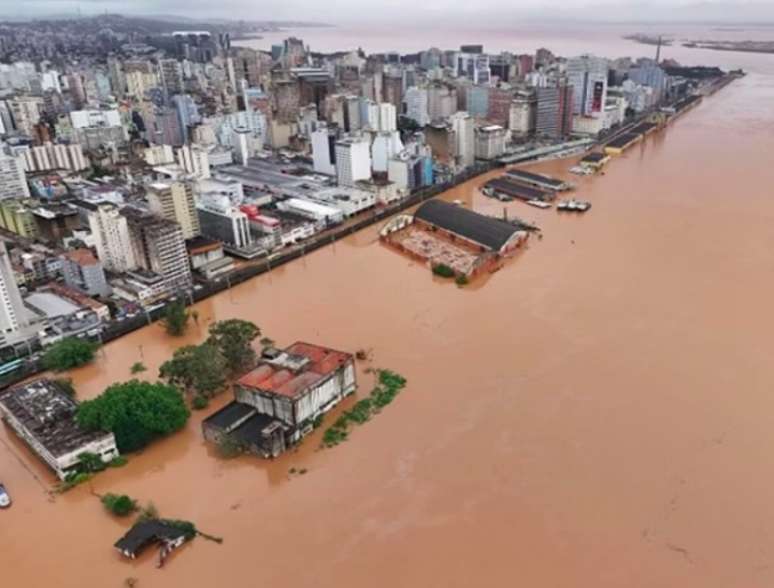-
The floods that hit Rio Grande do Sul in recent weeks have caused hundreds of deaths and left thousands of people homeless.
Photo: Playback on social media / Flip
-
Climate catastrophes like this tend to generate anxiety about the future, and scientists have even given it a name: “ecoanxiety” or “climate anxiety.”
Photo: advertising / Flip
-
The American Psychological Association (APA) introduced the new term in 2017.
Photo: Wikimedia Commons Harrison Keely/Flipar
-
According to the American agency, the term explains the “chronic fear of suffering an environmental cataclysm that occurs when observing the seemingly inevitable impact of climate change”.
Photo: Reproduction Twitter @belinhaah / Flip
-
In 2021 the term was included in the renowned Oxford Dictionary. Already two years earlier the institution had chosen “climate emergency” as the word of the year in 2019.
Photo: Disclosure / Flip
-
In Brazil, the Brazilian Academy of Letters (ABL) has already recognized the term “ecoanxiety” as a new word.
Photo: Wolfhardt/Wikimedia Commons/Flipar
-
According to the ABL, the term represents a “state of restlessness and anguish triggered by the expectation of serious consequences of climate change and the perception of helplessness in the face of irreversible damage to the environment”.
Photo: José Cruz/Agência Brasil / Flipar
-
The constant fear that the damage caused by human activities to the planet is irreversible is a growing concern.
Photo: Nilmar Lage / Greenpeace / Disclosure / Flip
-
According to scholars, interest in the topic has also increased due to a greater frequency of storms and floods in recent years.
Photo: reproduction bomdia.eu/Flip
-
“It is not a pathology, but a phenomenon that has to do with these uncomfortable emotions, such as anguish, sadness, impotence and even anger in relation to climate change”, highlighted the coordinator of the Study and Research Center on Trauma and Stress at PUC-RS, Christian Kristensen.
Photo: YouTube playback vicopoa / Flipar
-
Ana Lizete Farias, psychoanalyst and PhD in Environment at the Federal University of Paraná (UFPR), told the newspaper O Globo that this situation is “a consequence of the crisis of the collective lifestyle” caused by climate change.
Photo: Playback on social media / Flip
-
“As an environmental stressor, climate change has the distinction of being a truly ongoing and developing threat,” he said.
Photo: Lauro Alves/ Secom / Flipar
-
“There is no specific profile among those affected [ecoansiedade]but it is more common among those who are concerned about environmental issues and who are more prone to cases of depression and anxiety,” he explained.
Photo: Tânia Rego Agência Brasil / Flipar
-
Experts in Brazil say there are few academic studies on eco-anxiety in the country, but elsewhere the topic has already been widely explored by the scientific community.
Photo: Isac Nóbrega Agência Brasil Disclosure / Flipar
-
Researchers at the University of Bath, England, have conducted one of the largest studies yet on the topic. 10 thousand young people aged 16 to 25 were interviewed in 10 countries, including Brazil.
Photo: wikimedia commons Bärbel Miemietz / Flipar
-
The data from the study were published in the scientific journal “The Lancet Planetary Health” and show that, among the countries analysed, 59% of young people are very or extremely worried about climate change.
Photo: Li-An Lim Unsplash / Flipar
-
Considering Brazil alone, 67% of young people showed they were very concerned about the climate crisis.
Photo: Concresul/disclosure / Flipar
-
Another statistic that caught our attention was: 40% of young people say they resist having children because of climate change and 75% think “the future is scary.”
Photo: Disclosure/NOAA Satellites / Flipar
-
For 65% of those interviewed, governments are not taking sufficient measures to solve the problem.
Photo: Ma Ti Unsplash / Flipar
-
“Young people have been most affected because they generally have no ‘past’ experience without the presence of these extreme weather events,” highlighted Caroline Hickman, of the University of Bath and the Climate Psychology Alliance.
Photo: Gerd Altmann from Pixabay / Flipar
-
Other studies show that engaging in actions to reduce climate change can help address climate anxiety and improve well-being.
Photo: Markus Spiske Unsplash / Flipar
Share
Source: Terra
Rose James is a Gossipify movie and series reviewer known for her in-depth analysis and unique perspective on the latest releases. With a background in film studies, she provides engaging and informative reviews, and keeps readers up to date with industry trends and emerging talents.





